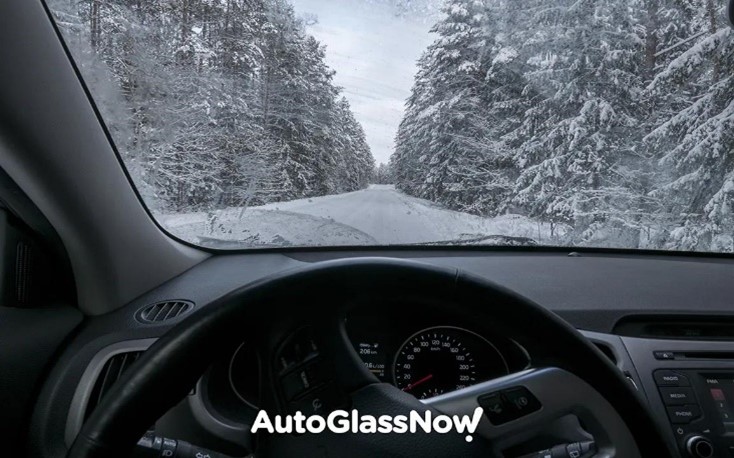 (CHARLOTTE, N.C. (January 31, 2024))
(CHARLOTTE, N.C. (January 31, 2024)) - Helpful Hint from Auto Glass Now: Pouring Hot Water on a Cold, Icy Windshield Is not a Good Solution
- Helpful Hint from Auto Glass Now: Pouring Hot Water on a Cold, Icy Windshield Is not a Good Solution
Wintry weather, gray skies, snow and sleet can limit visibility on the road, and a damaged or cracked windshield can make driving even more challenging.
 When the temperature drops, the risks of damage to the windshield goes up. Can cold weather alone crack a windshield? Not exactly. However, while extreme cold alone might not crack a well-installed and maintained windshield, it can exacerbate existing issues or create conditions that may lead to cracks. Essentially, cold weather can cause a windshield to crack and break if it is already chipped, cracked, or fractured due to the acute weather change.
When the temperature drops, the risks of damage to the windshield goes up. Can cold weather alone crack a windshield? Not exactly. However, while extreme cold alone might not crack a well-installed and maintained windshield, it can exacerbate existing issues or create conditions that may lead to cracks. Essentially, cold weather can cause a windshield to crack and break if it is already chipped, cracked, or fractured due to the acute weather change.
Auto Glass Now, one of the fastest growing glass repair and replacement companies, offers drivers tips to protect their vehicle against the set of unique challenges winter weather brings to the durability and maintenance of their windshield.
Common Causes of Windshield Cracks in Cold Weather
Knowing the factors that make the windshield more susceptible to damage and cracks in cold weather will help drivers protect and properly maintain it. If the windshield is already compromised by previous damage, poor installation or inadequate maintenance, these issues can worsen dramatically in cold conditions. Some of the most common causes of cracks during colder months include:
- Ice: Ice formation can apply undue pressure to small existing chips or imperfections, leading them to expand into full-blown cracks.
- Road Salt: While road salt is often necessary to keep roads safe, it can be kicked up into the windshield at high speeds. This causes small craters or pits that can worsen into cracks when not addressed quickly.
- Hail: Winter storms often bring hail, which may strike the windshield with enough force to cause immediate cracks or create weak spots that later transition into cracks.
- Frozen Wiper Fluid: Using a wiper fluid that freezes easily can cause localized stress on the windshield, which could turn into cracks over time.
- Temperature Fluctuations: Glass expands and contracts with temperature changes. Rapid swings from cold to hot (or vice versa) can cause a windshield to crack.
How to Prevent Windshield Damage during Colder Weather
While a windshield can crack from cold weather due to other factors, drivers can take a proactive approach to prevent damage during colder temperatures, including:
- Keeping Windshield Wipers in Good Condition: Worn-out and dirty wiper blades can scratch the windshield, making it more susceptible to cracking. Therefore, it’s essential to routinely clean the windshield wipers—and replace them at least once every 12 months to keep them in good condition.
- Never Using Hot Water to Clear Ice/Snow Off the Windshield: While it may seem convenient at the time, using hot water to clear ice and snow from the windshield causes rapid temperature changes, leading to cracks.
- Utilizing the Car’s Defrost System: Defrost systems are designed to gradually increase the glass temperature, reducing the risk of cracks.
- Parking under Cover If Possible: A simple solution for protecting the windshield from the elements is parking in a garage or under a carport.
- Closing Doors Gently: Slamming car doors can cause vibrations that may lead to windshield cracks, especially if the windshield is already damaged.
- Using a Windshield Protector: Windshield covers can keep ice and snow off the glass, reducing the risk of cracks and making it easier to prep the vehicle for the drive ahead.
- Using a Proper Ice Scraper: Choose an ice scraper specifically designed for car windshields to minimize the risk of scratching or cracking the glass.
“Winter weather presents challenging times for windshields. But proper preventative care and maintenance can make a world of difference,” said Nick Ouimet, President of Auto Glass Now. “Our local Auto Glass Now teams are trusted experts in caring for auto glass. We are here to help ensure drivers are safe on the road with quality glass repair and replacement. We have hundreds of locations and mobile vehicles across the country to service all our customer’s needs.”
Read more about how your windshield can be affected by weather here! Auto Glass Now teams cover the United States from California to Florida with the best value combination of fast, reliable, convenient service, technologically advanced repairs and ADAS calibration. These new and remodeled facilities feature bright, welcoming customer service lobbies, the latest tools and equipment, and each Auto Glass Now location has a team of highly trained experts in repair, replacement and ADAS calibration. For service, call 1-888.4.FIX.GLASS.
Visit AutoGlassNow.com to learn more.





